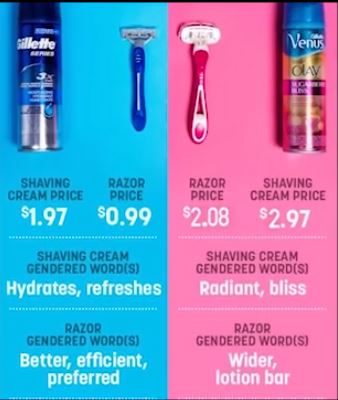Gillette’s controversial advert came as an affront to its main customer base, but is publicity ever bad and were men even the intended audience despite their predominant featuring?
Advertising is effective when it achieves the three R’s – Right Message to the Right Person at the Right Time. When adverts provoke controversy, they stimulate debate. This draws out the impression and makes it more impactful. As they say in Marketing: ‘A happy customer tells 3 people. An angry customer tells a thousand!’
How many times have you discussed with your friends or colleagues something new and different that had been encountered the previous day?
We haven’t seen much controversy in an advert for awhile until Gillette came along with their new slogan ‘The Best A Man Can Be’.
This may seem as if Gillette are jumping on the bandwagon of Woke Capitalism, where companies pretend to care about issues of social justice to sell products to people who ‘pretend’ to hate capitalism.
The advert insulted and angered many in its apparent foisting of collective guilt upon men for falling short in their ‘duties’ – a crude form of identity politics where nobody is an individual, just a constituent of the hive masculine organism, each equally culpable for the rest of their colony.
Contrary to appearances, this wasn’t simply Gillette picking what they considered the ‘winning’ side in the debate on masculinity and feminism to push their product sales or show supportive corporate responsibility .
Nor was it a risky marketing tactic to deploy politically correct virtue signalling.
Instead, it represented a grandstanding display for their new product range under the occluded veil of self-righteous moral indignation to capture lefty-millennials and women.
Marketing in 2019 is an incredibly sophisticated science.
Sure, the overall response is largely negative, but as the adage goes, there’s no such thing as bad publicity. They sure hit the mark with stirring up some controversy that’ll generate free publicity and extend their reach – a marketing department’s dream.
Driven by personalised data harvesting that builds an image of what makes us tick. An incredible amount of money has been spent on how to brainwash individuals into buying products.
For those who have been saying this advert was a risky move, it is not. There was no risk involved. If there were any, they wouldn’t have aired it.
What if someone with a doctorate in consumer branding did their calculations? Figuring out that the guys who were offended by the commercial by and large wouldn’t bother to follow through on those accusations of boycotting.
But on the other hand, Gillette would pick up x% more customers who were leftist in political orientation and women.
They took this all into consideration, largely that most men were too lazy to switch brands. But on the flipside, we’ll pick up some more women, millennial leftie SJWs and do-gooders.
If they could get more men to buy Gillette razors by showing some woman with giant boobs or a classic car, they would.
They could not care less about leftist politics.
Consider a board meeting with the heads of advertising, psychologists, marketing executives etc. from Gillette and their parent company Proctor & Gamble.
An ultra-capitalist company with one of the most valuable brands on earth.
Are they really going to say: “It’s time to hire a leftist cat lady with a track record of ads on how bras are oppressive and singing female genitals to make a bizarre and cringe worth commercial about leftist Identity Politics that’s sure to alienate many of our customers”?
“We owe it to the world to make more people hate our company and the Social Justice movement.”
Maybe the ad isn’t for the blokes?
The reality of the situation is that this advert wasn’t really targeted at men.
Procter and Gamble, Gillette’s parent company, dominates the household goods market. They’ve made several questionable ad campaigns targeting progressive millennial, upper-middle class women to push their products.
Gillette is also suffering stiff competition from the likes of Dollar Shave Club, Harry’s and Schick with lower price and higher quality, suffering a market share drop of 50-70%, it was forced to cut prices by 15% in the last few years to remain competitive despite its large advertising budgets and sports star campaigns.
The reality is: men don’t buy all that much.
Women purchase or highly influence 83 per cent of the non-business to business consumer goods in America. Globally, women account for $20 Trillion in annual consumer spending. Most of the income growth in the U.S. during the past 15-20 years is attributable to women, according to consumer specialist firm Nielsen.
Women are earning more as they become better educated, participating in the workplace and engaging in more independent ventures. Young women already surpassed young men in earnings some time ago and are expected to make more than men overall by 2028.
Women are also invaluable customers, with 92 per cent telling others about deals and the items they find. Do men discuss the same? Do they heck!
As far as advertising is concerned. Nobody gives a crap about advertising to guys.
Almost all advertising is pitched towards women.
Even men’s products are advertised to women.
Chances are, if you don’t see a bikini or classic car in the commercial, that means men aren’t buying the product, women are.
The whole controversy is little more than a cynical, calculated marketing ploy.
Gillette is one of the most valuable brands in the world, they wouldn’t risk compromising that on anything.
For all the men out there infuriated by Gillette’s dubious moral high ground lecturing on how men should behave, they’d be well placed to ask themselves how this company could swing from having curvaceous female models in beyond skin-tight blue latex bodysuits as walking billboards for their product back in 2011.
Or even how Gillette were somehow better placed to lecture us all with their ‘pink’ tax on women’s products still going.

So, instead of appealing to more men to sell its razors and shaving cream, Gillette makes a very manipulative emotional appeal to women because they are the people who actually buy the products in the majority of American homes.
Don’t believe me?
Look at two scenes from the advert itself.
Firstly, the mother holding her tortured son as she deals with the trauma of helplessness to combat a force beyond her ability to alleviate. No father and husband on hand to console and guide, or an older brother to watch out for the young boy. A setting more familiar for many women out there than they’d care to admit.

A long zoom in here focuses on the intended market of the ad. It’s not men, but women.
In another scene, a slick-corporate sleazebag executive touches without consent the single woman in a board room. Stuffed to the rafters with, once again, white men, he proceeds to ‘mansplain’ her answer away with “what she’s trying to say is…”. The shift to her look of disbelief and defeat echoes how many women feel in workplaces with male bosses who feel entitled or simply dismissive of their contributions or agency.

A powerful message, you’d be inclined to agree.
Three times in 30 seconds we see how women are the victims of this ‘Toxic Masculinity’.
The issue of bullying glosses over its universal human nature, and yet again, both bullying and sexual harassment are conflated with masculinity, as though the three are inseparable.
I hear the phrase ‘toxic masculinity’ tossed about as this coercive force in society spoiling the party for everyone involved. You would be forgiven for thinking they aren’t referring to one form, but to masculinity itself. Not once is masculinity espoused as a virtue.
Invoking common leftist talking points that women have no chance for advancement in a structurally patriarchal, and by association, oppressive working environment, is reinforced by imagery of unchecked bullying in the work-space. This gives rise to sentiments that this is a company that cares for the difficulties women face.
If you want to tell men to be honourable citizens extolling integrity and compassion, great, we’re all for it. But treating the condition of being a man as some form of original sin we must all seek absolution from wasn’t going to be well received by the men.
Boys will be boys
The play-fighting of the boys is different for men and women.
For men this represents a form of socialisation, learning what force is necessary and appropriate. A process of how to temper their natural strength compounded with their naturally occurring aggression producing hormones. Communication skills and self-control are developed, both toward boys and girls.
For women, they aren’t raised with getting dirty, play-fighting or getting hurt. The socialisation boys undergo looks like violence from their perspective. Physical violence is deemed much more dangerous to women, thus should be strictly prohibited in all its forms from their outlook. Gillette’s advert reaffirms this subliminal belief in their mind, endearing women toward the company on a subconscious level.
Get With The Programme
The multiple TV screens moment is significant for its allusions to movies and tv series to quickly deliver the backstory on plot events. That’s where you’re used to it – fiction movies where they don’t have the time to give you all the backstory. But when used in real life, it takes on a slightly different meaning.

The “everyone is talking about it” shot is a psychological pull to convince viewers of the gravity of a situation. By showing numerous broadcasts supporting the notion that the world is focused on a singular issue, it suggests that anyone not involved are part of the out-group. If you don’t agree with those who are very concerned by this, you’re not part of “the tribe” of good people, but part of problem – those in denial.
This is a very powerful mental trick because it triggers very primal desires to be part of a community, as being rejected membership has conventionally brought our species nothing but suffering and death. We’re evolved to want to be part of the popular kids.
The association then, that bad things happen, mostly to women and kids; those bad things happen because men will be men, and that normal behaviours entrenched in masculine culture are the cause. Therefore, the only solution, men need to change, women absolve all responsibility. For some, this is a conniving expedience, for most a sigh of relief.
The only good men are the men who do the changing of everyone else. But those men are still responsible for the collective hive of other men.
#Believewomen
The “We Believe” is invoked in the advert as a phrase synonymous with Women’s Rights Groups (another signpost to the intended market for the advert).
It’s short for “We Believe Women”. #Believewomen deals with women coming forward with allegations of sexual misconduct. Often, even in circumstances of legitimate sexual assault, women don’t come forward in a timely manner, leaving little to no evidence available for charging the perpetrator. This has led to the demand for bringing forth cases of rape and sexual assault without evidence, or to put another way, without the due process of law.
While sympathies are with those who believe this to be necessary for those women needing justice, the practice has resulted in many cases of men being expelled from college, fired from work, and as we aren’t likely to forget anytime soon, the baseless accusations surrounding the Kavanaugh hearings. Because some have used the movement to further their own vindictive ends, it has decayed the positive intention with which it originated. Those who manipulated their power have led to the movement being shunned by men’s rights groups as an implicitly anti-male, misandrist crusade in stark contradiction to the basic premise of our justice system – innocent until proven guilty.
Professors Bradley Campbell and Jason Manning’s book ‘The Rise of Victimhood Culture’ goes some way to explain why and how for-profit companies like Gillette would deploy this victim narrative for females by conflating bulling and the love of an innocent child with the other of masculinity as this perverse oppressor oppressed relationship. They simultaneously ignore the bullying that is attributable to girls and women, which would never have gained the kind of emotional appeal they are looking for.
In doing so, they attempted to ingratiate themselves with a largely female market.
We may see more chorus lines of tautly toned feminine backsides bearing the Gillette moniker in trademark corporate blue at motorsports circuits in future, but for the meantime, outrage at masculinity is in fashion. Welcome to woke capitalism, enjoy the ride.


